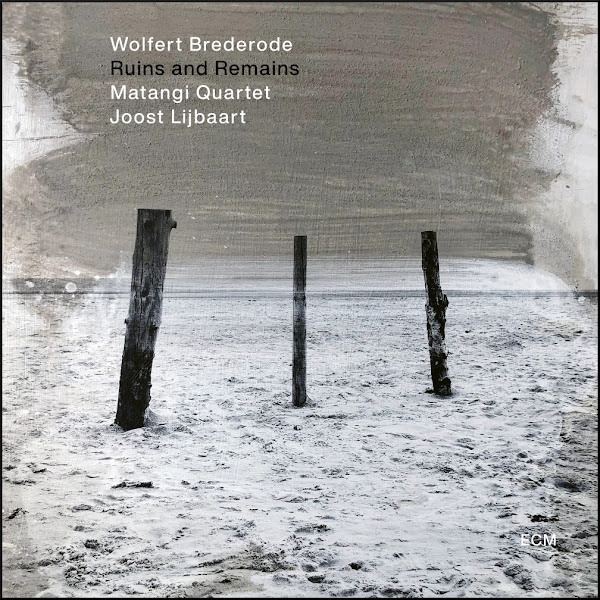There is no right reaction to great music
Quite justifiably the adventurous Matangi Quartet from the Netherlands received acclaim for their recent recording of quartets by Silvestrov, Schnittke, and Shostakovich. But their 2022 ECM disc of Ruins and Remains, a suite for piano, string quartet and percussion composed by Wolfert Breferode slipped under the media radar, probably because in the meaningless ontology of music genres it is pigeonholed as 'jazz'. Composer Wolfert Breferode again defies those meaningless pigeonholes: he studied classical and jazz piano at the Royal Conservatory of The Hague before establishing a formidable reputation as a leading Dutch jazz pianist and recording four albums for ECM.
Ruins and Remains was composed by Wolfert Breferode in 2018 in response to a commission to mark the 100th anniversary of the end of World War I. Since the premiere however the work has evolved to embrace a wider perspective on human frailty, helped by the improvisatory experiments of the Matangi Quartet and percussionist Joost Lijbaart.
ECM's promotional copy describes how in Ruins and Remains "there is a vulnerable but resilient quality to the music, as it hovers over its emotional terrain, with moods both bleak and guardedly hopeful". Which means it lacks the conventional development and form which received wisdom demands as a feature of 'great' music. In turn this raises the question of whether development within a defined structure is a sine qua non of art music..
A few years back David Schmudde responded on his blog Beyond the Frame to my musings as to why classical music resists electronic elements like amplification and the use of synthesizers. David suggested that the answer partially lies in the way music is written. His thesis is that Western classical music has an easily recognised and repeatable structure defined by the convention of notation. He explains that "Notation provides formality for formal music... No standard for notating electro-acoustic instruments exist. Performances that include tape, electronic effects, and synthesizers are extremely difficult to notate... There is no equivalent across the myriad of 20th century musical inventions".
David Schmudde's theory can be expanded to provide a speculative explanation as to why Western classical music continues to struggle to engage with a new young audience. Notation provides formality for formal music, and it is this very formality of structure imposed by sonata form, formality of etiquette conventions and of emotional cues, that may be the insurmountable obstacle to a new younger rewired classical audience. Whatever we think of it, electronic dance music is the music of choice of the great majority of young people, an improvised genre that lacks both notation and fixed emotional cues. It is not insignificant that the prescient Matangi Quartet have performed with a dance music DJ.
By contrast a Mahler symphony, widely seen as the silver bullet for the regeneration of classical music, is formally notated with clear emotional cues, as in the Rondo finale of the Fifth Symphony. This codifying of emotional reaction has reached its nadir in the cringe-inducing explanations of the 'meaning' of masterworks by the presenters on the' new improved' BBC Radio 3, and in dribbles of embarrassing applause between symphony movements.
After its publication in 1966 John Fowles' novel The Magus attracted a huge number of young adult readers. However it also attracted criticism from the cognoscenti for its lack of conventional structure and ending. In a later edition Fowles was prompted to add a Foreword. In this he wrote:
...The foregoing will, I hope, excuse me from saying what the story 'means'. Novels, even more lucidly conceived and controlled ones than this, are not like crossword puzzles, with one unique set of correct answers behind the clues - an analogy ("Dear Mr Fowles, Please explain the real significance of...) I sometimes despair of ever extirpating from the contemporary from the contemporary student mind. If The Magus has any 'real significance', it is no more than that of a Rorschach test in psychology. Its meaning is what ever reaction it provokes in the reader, and so far as I am concerned there is no 'right' reaction.










Comments